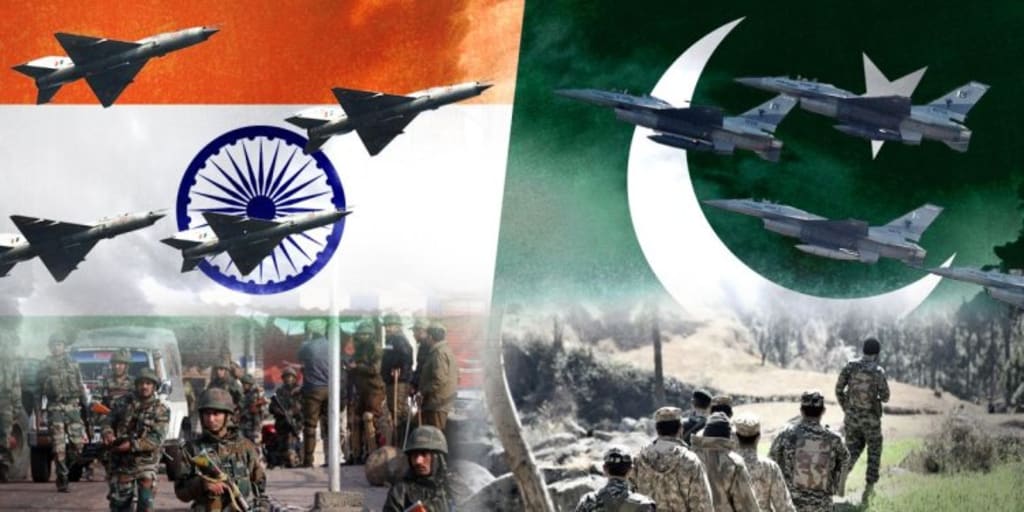Top 10 Reasons for the India-Pakistan War
Top 10 Reasons for the India-Pakistan War

India and Pakistan, two neighbouring countries in South Asia, have been engaged in numerous wars and border disputes since their independence from British rule in 1947. The most significant of these conflicts have been the wars of 1947-48, 1965, 1971, and 1999. While the causes of these wars are complex and multifaceted, here are the top 10 reasons that have contributed to the India-Pakistan conflicts.
Kashmir Dispute: The Kashmir dispute is one of the primary reasons for the India-Pakistan conflict. After the partition of British India, Kashmir was a Muslim-majority state, but its Hindu ruler acceded to India. This led to a territorial dispute, which has been ongoing since then. India accuses Pakistan of supporting separatist movements in Kashmir, while Pakistan claims that India is suppressing the rights of Kashmiris.
Border Disputes: India and Pakistan share a long and porous border that has been a source of tension between the two countries. There have been numerous border disputes, particularly in the regions of Punjab, Rajasthan, and Kashmir. The two countries have fought over the control of border areas, resulting in armed clashes and skirmishes.
Water Disputes: India and Pakistan share the Indus River and its tributaries, which are vital for agriculture and electricity generation in both countries. However, there have been disagreements over the sharing of water resources, with both countries accusing each other of diverting water and violating water-sharing agreements.
Terrorism: India has accused Pakistan of supporting terrorist groups that carry out attacks on Indian soil. Pakistan denies these allegations but has been accused of providing safe havens to terrorist organizations such as Lashkar-e-Taiba and Jaish-e-Mohammed.
Nuclear Weapons: Both India and Pakistan are nuclear-armed countries, and the fear of a nuclear war between them has been a constant concern. The nuclear tests conducted by both countries in 1998 further increased the tension between them.
Religion: The religious divide between India and Pakistan has been a significant source of tension between the two countries, particularly after the partition of British India. In 1947, when India gained independence from British rule, the country was divided into two nations – India and Pakistan. The decision to partition India was based on the idea that the predominantly Hindu areas would become part of India, and the predominantly Muslim areas would become part of Pakistan.
The partition of India led to the displacement of millions of people, with Hindus and Sikhs fleeing from Pakistan to India and Muslims fleeing from India to Pakistan. The process of partition was violent and chaotic, with mass killings, rapes, and looting taking place on both sides of the border.
Diplomatic Issues: India and Pakistan have had strained diplomatic relations since their independence. There have been numerous instances of visa denials, expulsions of diplomats, and diplomatic spats between the two countries.
Military Buildup: Both India and Pakistan have engaged in a military buildup, with both countries increasing their defence budgets and acquiring new weapons systems. This has increased the tension between the two countries and led to an arms race in the region.
Ideological Differences: India and Pakistan have different political ideologies, with India being a secular democracy and Pakistan being an Islamic republic. These ideological differences have contributed to the tension between the two countries.
Historical Legacy: The legacy of British rule in India has had a significant impact on the India-Pakistan conflict. The British policy of divide and rule, which led to the partition of India, has created a deep divide between the two countries that has not yet been bridged.
In conclusion, the India-Pakistan conflict is a complex and multifaceted issue that has been ongoing since their independence. The Kashmir dispute, border disputes, water disputes, terrorism, nuclear weapons, religion, diplomatic issues, military buildup, ideological differences, and historical legacy are some of the main reasons for the conflict. Resolving these issues will require political will, diplomatic efforts, and a commitment to peace from both countries.
About the Creator
Muhammad Atif
I possess a strong background in research and writing, with the ability to produce high-quality work. With keen attention to detail and excellent organizational skills, I am able to manage multiple projects and meet tight deadlines.






Comments
There are no comments for this story
Be the first to respond and start the conversation.